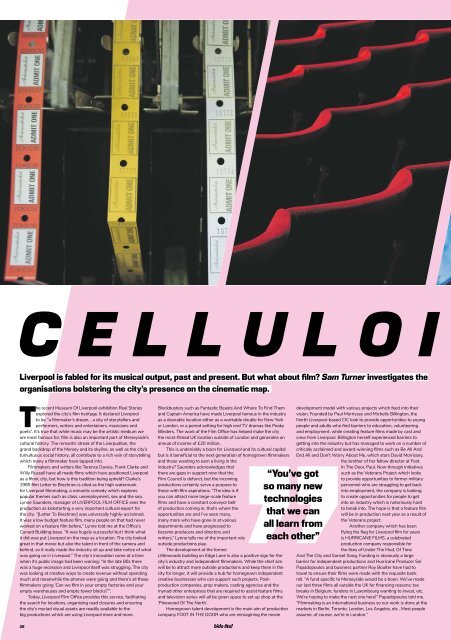Issue 83 / November 2017
November 2017 issue of Bido Lito! magazine. Featuring: SILENT BILL, SECRET SOCIETY OF SUPERVILLIAN ARTISTS, XAMVOLO, REMÉE, MERSEYRAIL SOUND STATION, HOWIE PAYNE, LOYLE CARNER, LIVERPOOL PSYCH FEST, ZOLA JESUS and much more.
November 2017 issue of Bido Lito! magazine. Featuring: SILENT BILL, SECRET SOCIETY OF SUPERVILLIAN ARTISTS, XAMVOLO, REMÉE, MERSEYRAIL SOUND STATION, HOWIE PAYNE, LOYLE CARNER, LIVERPOOL PSYCH FEST, ZOLA JESUS and much more.
You also want an ePaper? Increase the reach of your titles
YUMPU automatically turns print PDFs into web optimized ePapers that Google loves.
CELLULOI<br />
Liverpool is fabled for its musical output, past and present. But what about film? Sam Turner investigates the<br />
organisations bolstering the city’s presence on the cinematic map.<br />
The recent Museum Of Liverpool exhibition Reel Stories<br />
explored the city’s film heritage. It declared Liverpool<br />
to be “a filmmaker’s dream… a city of storytellers and<br />
performers, writers and entertainers, musicians and<br />
poets”. It’s true that while music may be the artistic medium we<br />
are most famous for, film is also an important part of Merseyside’s<br />
cultural history. The romantic streak of the Liverpudlian, the<br />
grand backdrop of the Mersey and its skyline, as well as the city’s<br />
tumultuous social history, all contribute to a rich vein of storytelling<br />
which many a filmmaker have tapped into.<br />
Filmmakers and writers like Terence Davies, Frank Clarke and<br />
Willy Russell have all made films which have positioned Liverpool<br />
as a filmic city, but how is this tradition being upheld? Clarke’s<br />
1985 film Letter to Brezhnev is cited as the high watermark<br />
for Liverpool filmmaking, a romantic comedy which explores<br />
popular themes such as class, unemployment, sex and the sea.<br />
Lynne Saunders, manager of LIVERPOOL FILM OFFICE sees the<br />
production as kickstarting a very important cultural export for<br />
the city. “[Letter To Brezhnev] was universally highly-acclaimed.<br />
It was a low budget feature film, many people on that had never<br />
worked on a feature film before,” Lynne told me at the Office’s<br />
Cunard Building base. “It was hugely successful but I think what<br />
it did was put Liverpool on the map as a location. The city looked<br />
great in that movie but also the talent in front of the camera and<br />
behind, so it really made the industry sit up and take notice of what<br />
was going on in Liverpool.” The city’s innovation came at a time<br />
when it’s public image had been waning: “In the late 80s there<br />
was a huge recession and Liverpool itself was struggling. The city<br />
was looking at creative ways to create revenue without spending<br />
much and meanwhile the phones were going and there’s all these<br />
filmmakers going ‘Can we film in your empty factories and your<br />
empty warehouses and empty tower blocks?’”.<br />
Today, Liverpool Film Office provides this service, facilitating<br />
the search for locations, organising road closures and ensuring<br />
the city’s myriad visual assets are readily available to the<br />
big productions which are using Liverpool more and more.<br />
Blockbusters such as Fantastic Beasts And Where To Find Them<br />
and Captain America have made Liverpool famous in the industry<br />
as a desirable location either as a workable double for New York<br />
or London, or a period setting for high end TV dramas like Peaky<br />
Blinders. The work of the Film Office has helped make the city<br />
the most-filmed UK location outside of London and generates an<br />
annual of income of £20 million.<br />
This is undeniably a boon for Liverpool and its cultural capital<br />
but is it beneficial to the next generation of homegrown filmmakers<br />
and those wanting to earn a living in the<br />
industry? Saunders acknowledges that<br />
there are gaps in support now that the<br />
Film Council is defunct, but the incoming<br />
productions certainly serve a purpose to<br />
those with film aspirations. “The idea is if<br />
you can attract more large-scale feature<br />
films and have a constant conveyor belt<br />
of production coming in, that’s where the<br />
opportunities are and I’ve seen many,<br />
many more who have gone in at various<br />
departments and have progressed to<br />
become producers and directors and<br />
writers,” Lynne tells me of the important role<br />
outside productions play.<br />
The development at the former<br />
Littlewoods building on Edge Lane is also a positive sign for the<br />
city’s industry and independent filmmakers. While the chief aim<br />
will be to attract more outside productions and keep them in the<br />
city for longer, it will provide a hub for homegrown independent<br />
creative businesses who can support such projects. Postproduction<br />
companies, prop makers, casting agencies and the<br />
myriad other enterprises that are required to assist feature films<br />
and television series will all be given space to set up shop at the<br />
‘Pinewood Of The North’.<br />
Homegrown talent development is the main aim of production<br />
company FOOT IN THE DOOR who are reimagining the movie<br />
“You’ve got<br />
so many new<br />
technologies<br />
that we can<br />
all learn from<br />
each other”<br />
development model with various projects which feed into their<br />
vision. Founded by Paul Morrissey and Michelle Billington, the<br />
North Liverpool-based CIC look to provide opportunities to young<br />
people and adults who find barriers to education, volunteering<br />
and employment, while creating feature films made by cast and<br />
crew from Liverpool. Billington herself experienced barriers to<br />
getting into the industry but has managed to work on a number of<br />
critically acclaimed and award-winning films such as Be All And<br />
End All and Don’t Worry About Me, which stars David Morrissey,<br />
the brother of her fellow director at Foot<br />
In The Door, Paul. Now through initiatives<br />
such as the Veterans Project which looks<br />
to provide opportunities to former military<br />
personnel who are struggling to get back<br />
into employment, the company is looking<br />
to create opportunities for people to get<br />
into an industry which is notoriously hard<br />
to break into. The hope is that a feature film<br />
will be in production next year as a result of<br />
the Veterans project.<br />
Another company which has been<br />
flying the flag for Liverpool film for years<br />
is HURRICANE FILMS, a celebrated<br />
production company responsible for<br />
the likes of Under The Mud, Of Time<br />
And The City and Sunset Song. Funding is obviously a large<br />
barrier for independent productions and Hurricane Producer Sol<br />
Papadopoulos and business partner Roy Boulter have had to<br />
travel to ensure their films were made with the requisite bank<br />
roll. “A fund specific to Merseyside would be a boon. We’ve made<br />
our last three films all outside the UK for financing reasons; tax<br />
breaks in Belgium, funders in Luxembourg wanting to invest, etc.<br />
We’re hoping to make the next one here!” Papadopoulos told me.<br />
“Filmmaking is an international business so our work is done at the<br />
markets in Berlin, Toronto, London, Los Angeles, etc.. Most people<br />
assume, of course, we’re in London.”<br />
26


















